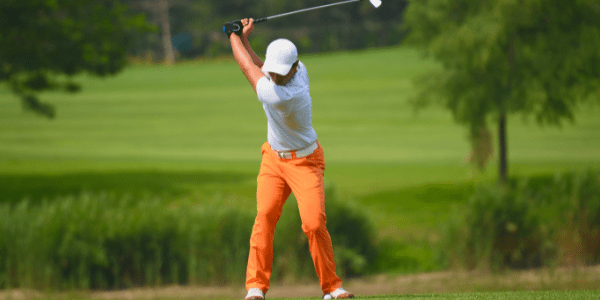
Slow Play’s Negative Impact on Your Mental Game
Some golf rounds can take too long when playing in a foursome. A timeout or a half-time break is welcomed in other sports.
Athletes in these sports utilize timeouts to catch their breath, compose themselves, and mentally prepare for the competition to resume.
However, long breaks between swings in golf welcome overthinking, over-analyzing, and allow negative emotions to fester.
For example, imagine playing in a major tournament. You are one stroke behind the leader during the final round. On the 14th hole, you drive a ball off course into the trees. Now you have to wait 15 minutes before your next swing.
If not careful, you may waste 15 minutes telling yourself how bad you are, how you messed up, and how you won’t be able to recover. Negative responses build pressure and interfere with focusing, potentially, for the duration of the tournament.
Freezing the Kicker
An equivalent to “unusual long times between golf shots” is the strategy of freezing a kicker before a game-winning field goal.
Imagine a football kicker attempting a 35-yard field goal to win the game with five seconds left on the clock. The kicker missed two extra points earlier in the game.
Just before he attempts a field goal, the opposing coach calls a timeout to freeze the kicker giving him extra time to overthink his previous misses and contemplate the importance of the kick.
But instead of a 30-second timeout, imagine the timeout lasting 15-minutes with no opportunity to perform practice or warm-up kicks.
While that football scenario is unimaginable, it is a reality that faces golfers consistently while playing a competitive round.
However, the length of time between shots is not the problem; It’s how a golfer uses that time.
Jordan Spieth and the 2022 Open Championship
At the 2022 Open Championship, Jordan Spieth posted a third-round 68 that moved him to 8-under and a tie for 11th.
On the 7th hole, Spieth hit a 371-yard drive that left him 4 feet from the hole for eagle. After his drive, Spieth waited close to 25 minutes before playing his next shot. Unexpectedly, Spieth missed the putt.
After the round, Spieth commented on the unusual delays between shots and his missed putt on the 7th hole (yes, even the pros are not perfect).
SPIETH: “It was probably 25, 30 minutes from when I teed off to when I had my putt. I just hate that. I just overthought it and missed it.”
Making Good Use of Your Time
The extra time can help you regain your poise, manage your emotions, and productively guide your self-talk…
For example, when you hit a bad shot or have an unfortunate bounce, you can use your time to regain your composure and refocus.
One strategy is to tell yourself, “Okay, get over it. Take a deep breath. Relax. What’s next? What is my strategy for this shot? Take another deep breath. Focus.”
The adage “It’s not what happens to you, but how you respond to it that matters” applies profoundly to golf. You will experience unexpected delays many times throughout your career. How you respond will make all the difference.
Have a plan before playing a round. Think, “What will I do to deal with unexpected delays?” “What will I do between shots?” “How will I refocus after a bad shot or unfortunate bounce?”
Do you prefer to talk to your playing partners, space out, enjoy the golf course, or have a snack or two?
When it’s your turn to play, be sure to click in your focus before you start your preshot routine. And do your homework for the shot again.
Related Golf Psychology Articles
- How to Cope with Slow Play in Golf
- Golfers Mindset for Slow Play
- Golfers Who are Frustrated with Slow Play
- Subscribe to The Golf Psychology Podcast on iTunes
- Subscribe to The Golf Psychology Podcast on Spotify
Get the Mental Edge – With Mental Training

Do you perform well in practice, but find yourself under-performing in games? Do you doubt your skills and second-guess yourself under pressure? If so, mental training will help you reach your goals in soccer. Many soccer players have the skill but are held back by low confidence and lack of pregame mental preparation!
You can get expert mental coaching with us from anywhere. Meet with us via Zoom, Skype, FaceTime or phone call. With today’s video technology, we are able to connect with athletes and coaches all over the globe.
Call Us Today to Schedule Your Free 15-Minute Session.
Find Out How You Can Benefit From One-on-One Mental Coaching!
888-742-7225 | 407-909-1700